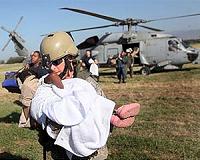| . |  |
. |
Constitucion, Chile (AFP) March 9, 2010 Two waste experts had an epiphany after touring quake-hit Constitucion: clean up the city with volunteers, and pay for it by selling recyclables pulled from the rubble. About a third of the buildings in Constitucion, population 50,000, were seriously damaged by the powerful 8.8 magnitude quake that struck south-central Chile early February 27. Most of those buildings are unsafe and will be demolished "Look at that wood -- it can be used for heating and cooking in the winter," said Avelino Salas Alarcon, a manager at one of Santiago's landfills, pointing at a house with its front wall missing. "And there -- that tin roof -- that can be re-used," said his friend, Gonzalo Lopez, who heads a NGO devoted to cleanups and recycling. Salas, Lopez and a friend were in Constitucion enroute to deliver emergency supplies to nearby fishing hamlets, and stopped to tour the devastated waterfront before heading out. Many of the city's worst-hit structures were on the waterfront, where the Maule river reaches the Pacific Ocean. Giant tsunami waves pounded the area more than an hour after the quake struck, and more than a week later a hip-high watermark is still visible three blocks inland. Despite the widespread destruction only 85 people died in those deadly pre-dawn hours, according to Luis Troncoso, with the coroner's office. At least 45 are missing and presumed dead. "Now all that's left is to let the ocean wash up the remaining bodies," Troncoso said. Teodoro Gutierez, one of the city's three Catholic priests, said that many waterfront residents participated in a tsunami drill two weeks before the quake. Nevertheless, he thinks the toll is considerably higher. On the waterfront, Salas pointed to sheets of corrugated tin, once a roof, laying over a pile of twisted metal and split wood beams. A large rowboat was encrusted deep inside the debris. Why waste all this? Carting it off to a dump would be a crime, he said. The waves ripped the walls off a nearby home, exposing a bathroom with an old-fashioned toilet and sink, both full of mud. "Here lie the dreams of a family," said Salas. The earthquake damaged a steel plant in the port city of Talcahuano and the price of steel -- and therefore scrap metal -- is rising, he said. Constitucion, affectionately known to Chileans as "Consti," was a resort town for the wealthy from around 1850 to 1940, when it was eclipsed by Vina del Mar, closer to Santiago. The quaint single story adobe brick homes built during the city's glory years -- nearly half the city -- were those hardest-hit by the quake. "Look at all that can be recovered from here!" Lopez said, pointing at another destroyed home. The building's side and front had collapsed, and the roof had caved into the living room. To the untrained eye, it was an ugly pile of debris. But Salas and Lopez spied wrought iron fences, steel beams and metal roof supports. "And that door and these windows are fine, they can be reused," he said. Lopez was already running figures. "We can mobilize 10,000 volunteers and get this place cleaned up in a matter of days," he mused. "The front loader rental and food and shovels for the volunteers can be paid by selling the recycled material. The city will pay nothing." Crazy? Lopez has already organized several large-scale "garbage festival" clean up events. His biggest feat was in 2009, when he led an army of 10,000 volunteers in removing 12 hectares (30 acres) of garbage from an illegal dump in Santiago's San Bernardo neighborhood. Lopez has roped in disparate groups such as Harley riders -- known here as "motoqueros" -- Jeep aficionados and Boy Scouts to help in cleanup operations. "So the bad boys become good boys," he said. "The only thing I need is a place for them to camp here." Time is limited. The late summer days are hot, but the nights are bone-chillingly cold. As temperatures drop it will be harder to recruit volunteers. Lopez also has to convince city authorities to hold off on debris removal. Front loaders have already pushed aside debris from the busiest streets, but drivers must still navigate around mountains of building waste in the side streets. City officials, many of whom have been working non-stop since the quake, were unavailable to comment on the project. They had more pressing issues -- like restoring the flow of electricity and water, feeding hungry and counting the dead. Undeterred, by Tuesday Lopez was already calling volunteers to head to "Consti" over the weekend and start the cleanup.
Share This Article With Planet Earth
Related Links Bringing Order To A World Of Disasters A world of storm and tempest When the Earth Quakes
 Haitians wary of US military reduction
Haitians wary of US military reductionPort-Au-Prince (AFP) March 9, 2010 A US Navy hospital ship was recalled from Haiti Tuesday as the US military cut its emergency deployment to the quake-hit nation, where aid efforts are now turning to reconstruction. The USNS Comfort, which had been anchored off Haiti's capital Port-au-Prince for the past seven weeks, was to leave Wednesday for its base in Baltimore, Maryland, US officials in Haiti and in the US Defense Depar ... read more |
|
| The content herein, unless otherwise known to be public domain, are Copyright 1995-2010 - SpaceDaily. AFP and UPI Wire Stories are copyright Agence France-Presse and United Press International. ESA Portal Reports are copyright European Space Agency. All NASA sourced material is public domain. Additional copyrights may apply in whole or part to other bona fide parties. Advertising does not imply endorsement,agreement or approval of any opinions, statements or information provided by SpaceDaily on any Web page published or hosted by SpaceDaily. Privacy Statement |